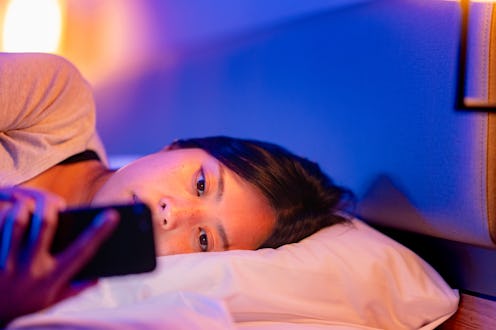Life
7 Ways Staying Up Late Could Be Harmful To Your Health

Getting a good night’s sleep is often easier said than done, especially when things like Netflix and Twitter and beating the next level of Candy Crush exist. But it is going to bed in the wee hours of the morning really that big of a deal? Is staying up late bad for you? Like most questions related to our health and daily habits, that answer is both yes and no.
Some studies suggest that there are benefits to staying up late. People who consider themselves night owls may be at peak physical performance at night, with one study suggesting they may demonstrate increased strength at nighttime. It’s long been said that creativity and staying up late are connected. A study published in Personality and Individual Differences found that people who stay up late are more likely to come up with “creative solutions” to a problem than those who wake up early.
It’s also no secret sleep is good for our bodies. The benefits of going to bed on time range from helping you get to sleep quicker to boosting your metabolism. One study even showed that sleeping more can add years to your life, with more deaths occurring among women who slept under five hours a night.
There is also research that suggests it doesn’t really matter if you aren’t an early riser, as long as you’re sleeping during consistent times. The study, conducted at Harvard, found that students who went to bed and woke up around the same time every day did better in school. Additionally, they defined those “regular” hours as anytime between 10 p.m. and 10 a.m.
While there isn’t one definitive answer to the question “is staying up late bad for you?”, studies show it could have some harmful effects on your health. It’s equally important to note that correlation and causation are not one in the same: while staying up late is linked to the seven health problems below, it does not necessarily cause them. However, if you find you’re not feeling great physically or mentally, looking at your sleep schedule is a good place to start.
1It Could Be Linked To High Blood Sugar
A 2015 study found health problems like high blood sugar linked to people with an evening-driven schedule. While the study was working with a relatively small sample size, its results showed that female participants who stayed up late were also more likely to have high blood sugar. Hyperglycemia, significantly high blood sugar, is often associated with other health conditions, from temporary problems like fatigue and headaches to more serious conditions like cardiovascular disease and kidney damage.
2It Can Lead To Poor Eating Habits
Late-night binges are all-too familiar to anyone who’s pulled an all-nighter studying or going down a rabbit hole of YouTube makeup videos. (I’m not alone in that, right?) However, one study found that staying up late make you eat more and, oftentimes, worse. As the results of that study suggest, we start craving denser food with less beneficial kinds of fat when we stay up past our bedtime, which can ultimately lead to poor health.
3It Could Be Linked To Heart Disease
What if you maintain a fairly regular sleep schedule throughout the week and just do the stay up late/sleep in late thing on the weekend? One study suggests you might still be doing damage to your health. Researchers called this sleep pattern “social jet lag” and linked its affects to heart disease. In fact, researchers found that for every hour your sleep schedule shifts, you increase your risk of heart disease by 11 percent.
4It Could Be Making You Sick
Sleep is healing, as anyone who’s been able to sleep off a cold will tell you. As stated by Mayo Clinic, sleep impacts your immune system. If you’re starting to get sick and aren’t getting a good night’s sleep, you may actually be making yourself sicker by not giving your body enough time to fight off illness or infection.
5It Might Be Linked To Depression
In a recent study, presented earlier this year, researchers found that people who consider themselves night owls were also more likely to report experiences symptoms of depression. This was especially true among participants who stayed up late and also had type-2 diabetes. While not necessarily a cause-effect relationship, it’s worth noting that the two seem to be intertwined to some degree.
6If You’re Staying Up To Study, You’re Probably Not Retaining Information
Sorry to bring you down, kids, but staying up late to study is likely counterproductive to improving your test scores. A 2016 report from Texas A&M suggests that staying up late to study, which often entails sleep deprivation, doesn’t help with long-term memory and negatively impacts your brain’s performance.
7It Affects The Amount Of Sleep You End Up Getting At Night
Unless you’re living that good life of being able to get eight hours of sleep regardless of when your head hits the pillow, you’re likely getting less sleep when you stay up super late. When you don’t sleep well or don’t sleep enough, it takes a toll on your body. Lack of sleep can slow down reaction time (not great for that morning commute to work) and also be linked to how stressed you feel. So, while you certainly don’t need to be fast asleep by 9 p.m. sharp, it’s probably best to make sure you’re giving yourself enough time to actually get full night of sleep.